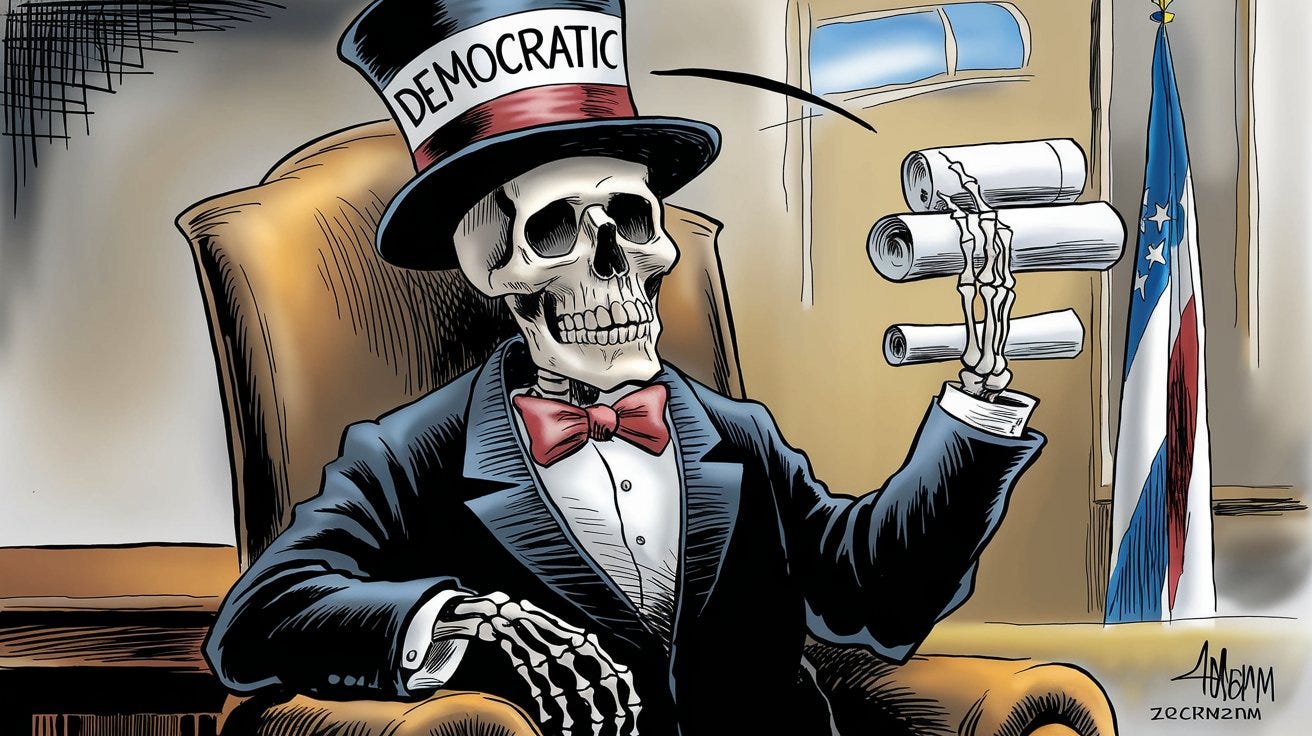Democracy died today in Romanian-Style: Voting Until the "Right" Candidate Emerges
The Constitutional Court annulled the first round of presidential elections, suggesting that democracy functions like a school exam.
The latest masterpiece? The first round of presidential elections was annulled by the Constitutional Court because, apparently, democracy works like a school exam: if you fail to produce the desired result, you just keep retaking it until you pass.
Let us consider this absurd spectacle with the seriousness it deserves—or rather, the utter lack thereof. Nine million Romanians trudged to the polls, braving weather, misinformation, and existential despair, only to have their votes declared null and void. Why? Because democracy, as practised here, seems less about representing the people and more about appeasing the puppet masters pulling the strings from Washington, Brussels, and who knows where else.
The Constitutional Court’s decision is a slap in the face to every voter, a reminder that their ballots are mere props in a theatre of power. Imagine the audacity: “Oops, we didn’t like how this turned out let’s do it again.” If Mark Twain were alive today, he wouldn’t need to write satirical plays; he’d simply transcribe the minutes of Romania’s Constitutional Court hearings.
The justification? A vague suggestion of “irregularities” and “external interference.” How poetic. If this interference was so grave, where are the heads rolling at the top of Romania’s intelligence services? Surely, if the vote was compromised, someone at SRI or STS deserves a stern finger-wagging, if not outright dismissal? Instead, we’re left with a curious silence from those responsible for safeguarding the electoral process. Almost as if the whole fiasco is… let’s say, orchestrated?
Ah, Călin Georgescu, our supposed maverick in this tragicomedy. He’s the bogeyman du jour, the "competitor not controlled by the system," as some say. Naturally, this makes him Public Enemy Number One in a game where only pre-approved players are allowed to win. Rumours swirl that Georgescu’s candidacy has the establishment so nervous that they’d rather rerun the election than risk his potential victory. How democratic of them.
Of course, should his popularity persist, one can only imagine the next steps. A sudden arrest, perhaps? A conveniently unearthed scandal? Anything to ensure the “correct” candidate ascends the throne. After all, why leave the outcome to chance—or to the will of the people?
It wouldn’t be a Romanian political crisis without the spectre of George Soros hovering somewhere in the background. Throw in Brussels and Washington for good measure, and you have a trifecta of external forces allegedly dictating Romania’s fate. According to this narrative, these powers-that-be are less interested in Romania’s sovereignty than in ensuring their chosen stooges maintain control, perpetuating a system of corruption and servitude.
If true, it paints a bleak picture of Romania as little more than a colony with voting booths. But even if the conspiracy theories are overblown (and aren’t they always?), the optics are damning. Democracy cannot flourish in an environment where elections are annulled on flimsy pretexts, and voters are treated as an inconvenient formality.
And then, the pièce de résistance: the timing. The decision to annul the elections was handed down on December 6, St. Nicholas Day a day of giving, generosity, and, apparently, the systemic dismantling of democracy. It’s almost poetic in the way only a cynical political manoeuvre can be. Some have likened it to the execution of Ceaușescu on Christmas Day a grim "gift" to the Romanian people.
But this is no mere coincidence. It’s a calculated move, a ritualistic reminder that the system will do as it pleases, sacred days and democratic principles be damned. And so, the Romanian people are left with their stockings full of disappointment and their democracy dangling by a thread.
What’s next? A descent into dictatorship, perhaps? If we’re already rewriting the rules mid-game, why stop at elections? Let’s just declare the winner by decree and save everyone the trouble. After all, why bother with the pretence of democracy when it’s so much easier to appoint leaders behind closed doors?
But here’s the thing: Romanians are tired and exhausted, even of the lies, manipulation, and cynicism that have come to define their political landscape. The annulment of these elections may well be the final straw. If the system thinks it can subjugate the will of the people indefinitely, it’s in for a rude awakening.
The solution? Fight back, not with chaos, but with unity and resolve. The millions who voted in the first round must become a united front defender of the Constitution and champions of democratic principles. Let this be a rallying cry for a Romania that refuses to be a pawn in someone else’s game.
In the end, democracy is more than an election it’s a principle, a promise that the voice of the people matters. The annulment of these elections isn’t just an attack on that promise; it’s an affront to every Romanian who dared to believe in a better future.
But hope is not lost. As long as there are those willing to stand up, speak out, and demand better, democracy can be revived. It’s time to prove that the Romanian spirit, though battered and bruised, is far from broken.
So, let’s raise a glass to a free, sovereign, and democratic Romania and to the eventual downfall of those who would undermine it. Cheers to a brighter, more just future may it arrive sooner than the next annulled election.



